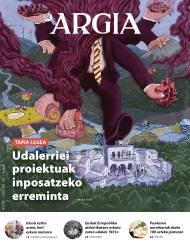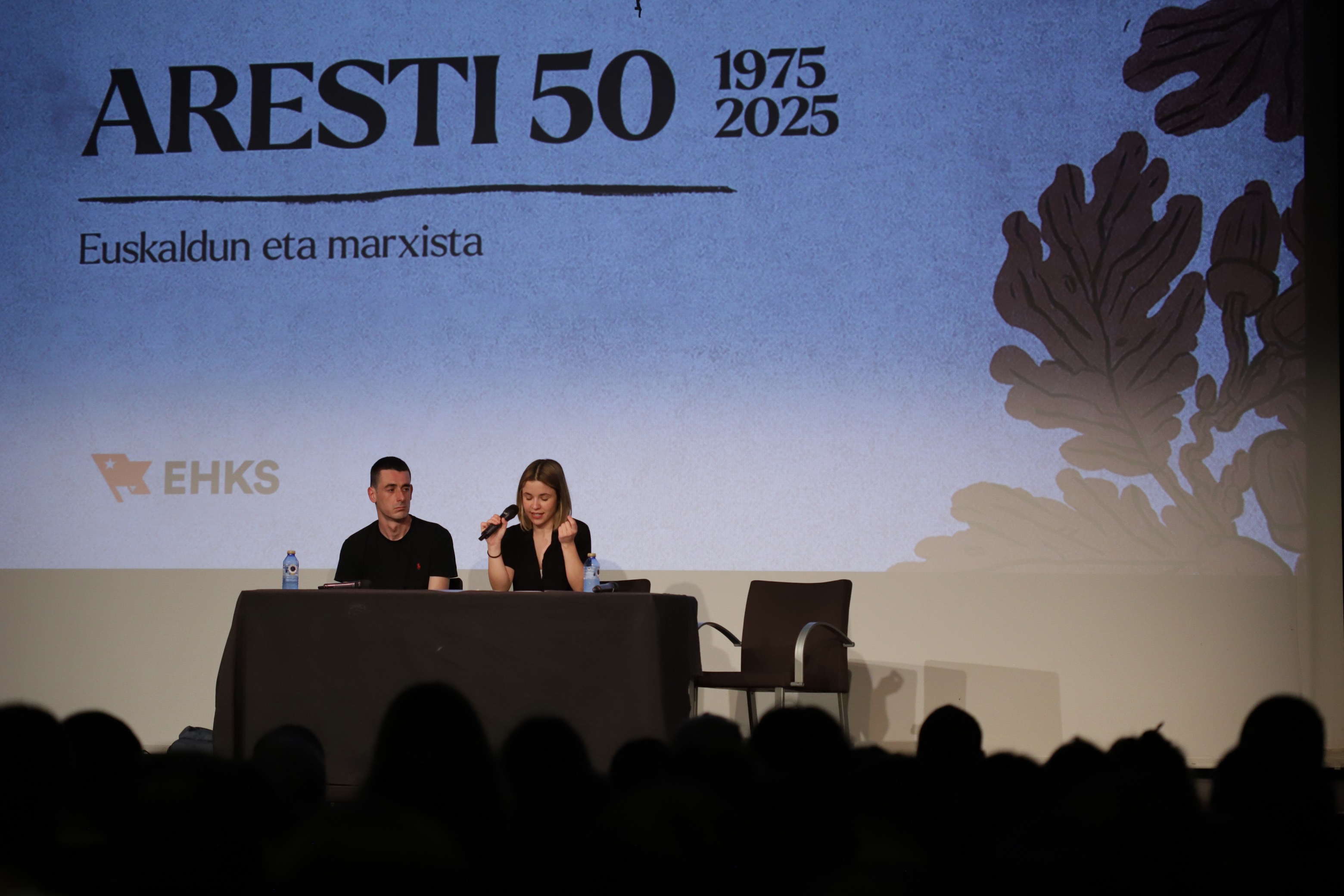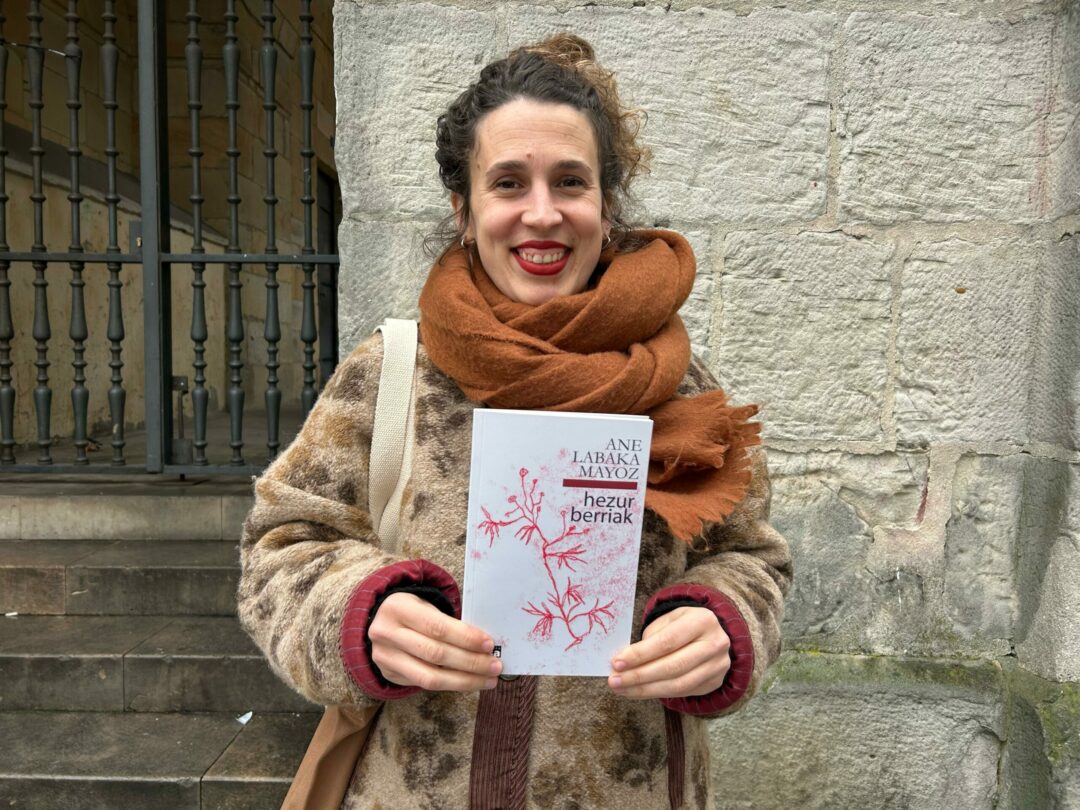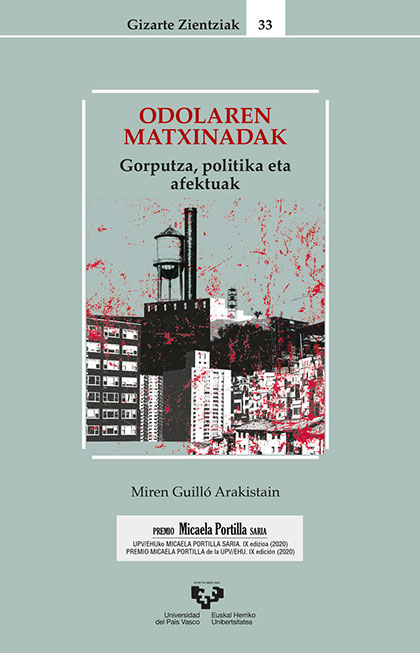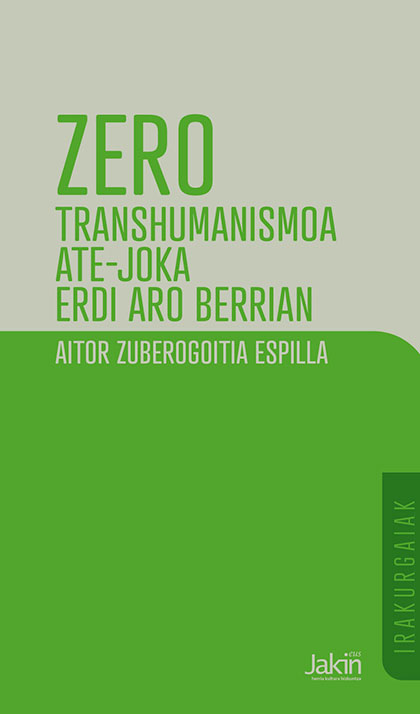"Emigration has been and is a radical experience because the migrant never knows if he will return"
- Azucre tells the story of 1,700 young people. In 1853, they left Galicia and traveled to Cuba in search of work and future in their sugarcane plantations. But the reality was very different. The great Galician landlord Urbano Feijóo of Sotomayor, in his eagerness to promote white colonization on the island, led the children to be deceived to use them as slaves. In his first novel, Bibiana Candia collects these real facts. It has recently been awarded by the Association of Booksellers of Navarra.

Idazlea eta artikulu-egilea da. Ikuspegi feminista eta kritika sozial zorrotza dira bere idazkien bizkar-hezurra, umore dosi nabarmen batez. La rueda del hámster eta Las trapecistas no tenemos novio olerki bildumak, El pie de Kafka eta Fe de erratas kontakizun-liburuak argitaratu ditu. Jot Down, Letras Libres eta The Objective aldizkarietan kolaboratzen du. Azucre da bere lehen eleberria.
Why was this story unknown?The Galician slaves
were not a hidden story, but nobody knew it. That was what drew me the most. It was a kind of enigma. A friend of mine talked to me about this, and looking online, I got a lot of information, but I was asking people, all Galicians, and nobody knew anything. I was surprised how it has not come to us through popular memory. There's something that doesn't work well.
It's not a matter of interest, because when you tell people it's really interesting, but history didn't travel well between generations, and so I decided to write. I wanted to make a collective testimony, seen with the eyes of the protagonistas.Tenemos many cold data from the files, but you have to listen to the human part and include what happened in the memory of our people.
Are poverty not transmitted as much as great victories?
The epic has a dark side. The epic is built on the lives of many poor people and their knowledge makes society more mature.
I found other similar facts. For example, the British used the Irish as slaves in some copper mines and cotton fields in the United States. They have always happened with the poorest, with the breakfasts. The universal law is that there will always be desperate people and unscrupulous people taking advantage of them. That doesn't change. It is cyclical and repeats itself vez.Es a mechanism that moves the world.
The great scandal surrounding the case of Azucre was not the presence of slaves on the island, but the enslavement of the compatriots, the whites. That was unacceptable.
How did it collect historical data?
Digital. A lot of documentation is available on the Internet. The main document is a report in the Congress of Deputies. Three families of these young people denounced the contracts and Galician MP Ramon de la Sagra took the issue to Congress. The actual testimonies that are collected put the chicken meat on you.
Reading this book is an immersive experience. You feel present. How did you do that?
I wanted to express the collective memory. What I was looking for was a story in which the voices of the protagonists intersect to tell you what happened to them. One speaks and the other responds, or speaks in plural or directly with the reader. I sought a proper verbal style, that of those stories that come from oral transmission. The hardest thing was to get the narrative voice.
I did a lot of tests: first person, third person, plural... but it didn't work. So I decided to use them all at once. It was crazy, paranoia, but it worked suddenly and from then on everything was fast. I documented myself as if I had to write a canonical historical novel, to create a concrete setting and to let myself know what those kids would find. Then, knowing what was going to happen to them, I released fictional characters in that environment and allowed them to react freely. What I've sought is the balance between historical truth and total fiction. What I was looking for was for the reader to know those rapacious [young boy in Galician]. Sometimes we think 19th-century people belong to another planet or species. We feel very far away, but we are more similar than we think.
When you say “1,700 young Galicians were taken to Cuba to work on the sugar cane and ended up as slaves”, it’s a harsh phrase, but within ten minutes you’ve been forgotten. It's just one more headline. But if you personalize these young people, if you know them individually, you see that they can be like us, and at that moment, perception changes.
On the other hand, a popular legend has to be "contaminated" by popular language, folklore and beliefs, and that is why I use many elements of this kind. Galicia is very rich in this regard. The sea is actually a mythological space of its own.
.jpg)
"It's a universal law that there will always be desperate people and unscrupulous people taking advantage of them."
Why does it claim the importance of knowing the past?Knowing where we came
from is fundamental to deciding where we want to go. Everything that has to do with our predecessors affects us, even if we do not know. Our education and our worldview is shaped according to their experiences. So it's important to know the past.
My grandfather, for example, was a peasant, from a small town near Santiago de Compostela. It was simple and almost unschooled. If I was born a few decades earlier, it would probably be one of them. Seeing him, I realized that I knew those people of this story, because the camp in Galicia has not changed much since the 19th century. It's a little sounding, but nothing else. Small towns are very traditional, very glued to the ground. I started to find a lot of things that have to do with our identity and my authenticity.
The verses of Rosalia de Castro that I put at the beginning of the book – "Galicia is probe i a Havana vou... Goodbye, goodbye clothes do meu corazón!” (poor is Galicia and I go to Havana... Goodbye, goodbye, my heart loves!") They're very significant. When this happened, Rosalia was 16 years old and had to meet him. All of a sudden I noticed all the pain these verses have. It all starts to mean. Knowing the past allows you to see how your culture has come to this day.
Emigration and Galicia have always been very united.
I do not know anyone who does not have a migrant family in Galicia. We in Brazil, Santo Domingo, Uruguay, Switzerland... All the people here have relatives in at least three different countries, and that also has a lot carga.En on the Moon, we say there's a Galician in the middle joke, and that ours are willing to go anywhere in search of a better future. This trend comes from a tragic past: the hunger we have been through, the central government has always treated us badly ...
The same drama as the people who come from outside to us now… We very soon forget that until recently it was
our ones who sought the way to survive in the world, in conditions lamentables.No matters if you flee from war or misery, all leaks are legitimate. We are now in a large part, but it can be changed at any time, as has happened in Ukraine. These people are like us, and they were quiet in their house until they were bombed.
Emigration has been and continues to be a radical experience, because the migrant never knows if he will return. Today there are many migrants living in unfortunate places, but history will not speak of them.
Are they current slaves?
Claro.Muchas Latin American and Eastern European women are brought with the excuse of working at home and then forced into prostitution. That's a huge slavery. This situation is repeated over and over again in history.
Are those remaining in the country also victims?
Without duda.Para what remains, the one who leaves is somehow dead. You have to mourn. Many times they don't know if what's gone will never come back. When they did not have so many communication resources, until a few years ago, the separation could be definitive. The figure of the widower without death is well known in Galicia.
Will not Feijóo de Sotomayor be the ancestor of Alberto Nuñez Feijóo?
No, ha. It is a very common surname and is also composed of Feijóo de Sotomayor. At the presentation of the book we did in Madrid, an heir came. I got a little nervous, but to my surprise I was very grateful for having the opportunity to know all this, because he didn't know anything either.
Are you a professional writer?
Now yes. In 2011, I decided to interrupt everything I was doing to immerse myself in writing. I've always been willing and willing to dedicate myself to this, but for a person from a family far from literature was difficult. There are no manuals that tell you what to do to make a writer. The only thing I had clear when it came to choosing studies was that I wanted to read and write. I started law school, and I moved on to philology. But I didn't like it either, because the relationship with my literature wasn't that academic, but a lot more organic.
I got an administrative position at the university of A Coruña as an official, but I felt I didn't have to be there. I thought I had to be writing. A novel cannot be written during the time you have left work, in which you also have to do all the things of everyday life. One day my partner proposed to go to Berlin because she was offered a job there and for me, once and for all, I could have written.
There I started with my literary project. I took out two books of poems, made several collaborations in some media and started collaborating with the Instituto Cervantes in coffee grounds. All this allowed me to write Azucre.
Now I can live from literature. Not so far. But it's a bet, like when you open a business. First you have to invest to collect the fruits. So what surrounds you is very important.
.jpg)
"It was very clear to me that bilingualism had to be present in 'Azucre,' because we bilingual people know that language change is not just a change of record."
Although it is evident, you often claim realities that we do not see. With the Legion of Ladies text, for example, he won the Julio Camba award in 2021.
I really like to take reality and raise the corner a bit to show what's saved.
Ladies in general are not very serious. Some present us as sweet amatxas, others, on the other hand, in a very funny way, like these women from small towns dressed in gown. And the latter are tough people. You've seen everything and always from the second line. With their apron, they kill a chicken with their hands, take some potatoes underground, or fry an egg. I wanted to reclaim the strength of those women who are capable of doing anything. I am very pleased with this article and I am proud. In addition, the answer has been very broad because the coats are everywhere: In Latin America, in Germany, across Europe ...
What is literature for?To see
the world from other eyes. To look with a different look.
To experience the world from a safe place. The opportunity to know other realities from the safety of your couch and how to spread your thinking. For me it is a field of total freedom.
Azucre is written in Spanish, but the presence of the Galician is evident, why? For
me the ideal would be for this novel to come out at the same time in Galician and Spanish, but it has been the first novel and since we had few resources we have brought it this way. However, it was very clear that bilingualism had to be present, because we bilingual people are clear that language change is not just a change of record. There are many nuances and a desire to develop with the interlocutor.
I wanted this to be present in the book. I wanted readers who didn't live with that reality to see and understand Galician in the text. I found that a nice challenge. Also, I couldn't imagine these characters talking in perfect Spanish, using composite forms of verbs, for example. It has worked very well and the title is also in Galician, without problems.
My intention is to show that languages are culture and wealth and do not have to be walls, just the opposite. The presence of the Galician enriches the text.
Azucre has been awarded this year by the Navarros booksellers. How do you feel?
It has been a great honor.He published the work with an editorial as simple as special, Pepitas de calabaza, and to see that an honest text can travel among the many titles published by the great editorials helps to recover literary faith. It teaches you that in this violent sea of news and marketing you can survive. I want to thank the readers and the booksellers.
Under the asphalt, the flower
Text: Monica Rodriguez
Illustrations: Rocío Araya translation
of: Itziar Ulcerati
A fin de cuentos, 2025
Ereserkiek, kanta-modalitate zehatz, eder eta arriskutsu horiek, komunitate bati zuzentzea izan ohi dute helburu. “Ene aberri eta sasoiko lagunok”, hasten da Sarrionandiaren poema ezaguna. Ereserki bat da, jakina: horra nori zuzentzen zaion tonu solemnean, handitxo... [+]
Perhaps we could say that this text is the result of an appraisal meeting. However, valuation meetings often leave a dry and bittersweet taste in the mouth. It's a sunny Tuesday afternoon. 16:53. We've connected to the valuation meeting, and we've decided to put a lemon candy in... [+]
Odolaren matxinadak. Gorputza, politika eta afektuak
Miren Guilló
EHU, 2024
Miren Guilló antropologoaren saiakera berria argitaratu du EHUk. Odolaren matxinada da izenburu... [+]
Astelehen honetan hasita, astebetez, Jon Miranderen obra izango dute aztergai: besteren artean, Mirande nor zen argitzeaz eta errepasatzeaz gain, bere figurarekin zer egin hausnartuko dute, polemikoak baitira bere hainbat adierazpen eta testu.
Zero. Transhumanismoa ate-joka erdi aro berrian
Aitor Zuberogoitia
Jakin, 2024
-----------------------------------------------------------
Hasieran saiakera filosofiko-soziologikoa espero nuen, baina ez da hori liburu honetan aurkitu dudan bakarra. Izan ere, biografia... [+]
Adolfo Bioy Casares (1914-1999) idazle argentinarrak 1940an idatzitako La invención de Morel (Morelen asmakizuna) eleberria mugarritzat jotzen da gaztelaniaz idatzitako literatura fantastikoaren esparruan. Nobela motza bezain sakona da, aparta bere bakantasunean, batez... [+]









